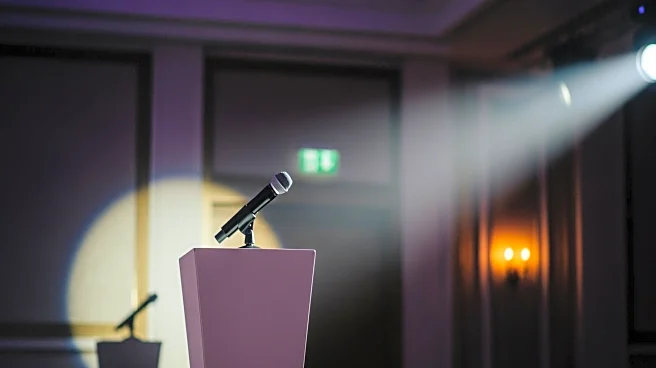What's Happening?
Kristen Stewart delivered a keynote speech at the Academy and Chanel’s 2025 Women’s Luncheon in Los Angeles, highlighting the ongoing gender inequality in the film industry. Stewart emphasized the lack
of opportunities for female filmmakers and declared a 'state of emergency' regarding the issue. She expressed frustration over the challenges faced by women in cinema, particularly in a post-Me Too era where it seemed that stories by and for women were gaining recognition. Stewart shared her personal experience with her directorial debut, 'The Chronology Of Water,' which took eight years to complete and faced significant hurdles due to its content. She described the process as a 'bare-knuckle brawling' effort, underscoring the difficulties women encounter when presenting narratives that are considered too dark or taboo.
Why It's Important?
Stewart's remarks underscore the persistent gender disparities in Hollywood, despite progress made in recent years. Her speech serves as a call to action for industry leaders to address these inequalities and support female filmmakers. The challenges she faced with her film highlight the broader systemic issues that can stifle diverse storytelling and limit the representation of women's experiences in media. By bringing attention to these issues, Stewart aims to foster a more inclusive environment where women can freely express their narratives without fear of rejection or censorship. This is crucial for the evolution of the film industry and for ensuring that diverse voices are heard and valued.
What's Next?
The speech may prompt discussions among Hollywood executives and stakeholders about implementing more robust measures to support female filmmakers. This could include increased funding for women-led projects, mentorship programs, and initiatives aimed at breaking down barriers within the industry. As Stewart's film 'The Chronology Of Water' approaches its release, it may serve as a catalyst for further conversations about the importance of diverse storytelling and the need for systemic change. Industry leaders might also consider revisiting policies and practices to ensure equitable opportunities for all filmmakers, regardless of gender.
Beyond the Headlines
Stewart's declaration of a 'state of emergency' highlights the cultural and ethical dimensions of gender inequality in film. It raises questions about the industry's responsibility to reflect societal changes and the importance of media in shaping public perceptions. The struggle for gender equality in Hollywood is not just about representation but also about challenging traditional narratives and expanding the scope of stories that are told. This movement could lead to long-term shifts in how films are produced, marketed, and consumed, ultimately influencing cultural norms and values.









